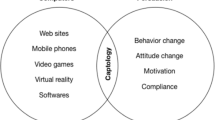Abstract
In an idea generation meeting the emotional context-aware is correlated the with participants’ performance. To achieve good results in idea generation sessions it is important that participants maintain a positive emotional state. In this paper we will present an agent-based idea generation meeting using an emotional context-aware model that includes several mechanisms, namely: the analysis and evaluation of events, emotion-based process and recommendation selection. In order to analyze and test the benefits of these mechanisms, we also created a simulated scenario in which agents generate ideas and are affected by contextaware situations. The simulation reveals that these mechanisms can increase the participants’ performance using some techniques. This study shows how the use of recommendation mechanisms can maximize meeting results in some situations.
Access this chapter
Tax calculation will be finalised at checkout
Purchases are for personal use only
Preview
Unable to display preview. Download preview PDF.
Similar content being viewed by others
References
Friedler, K., Bless, H.: The Information of beliefs at the interface of affective and cognitive processes. In: Frijda, N., et al. (eds.) Emotions and Beliefs: How Feelings Influence Thoughts. Cambridge University Press (2000)
Schwarz, N.: Emotion, cognition, and decision making. Cognition & Emotion 14(4), 433–440 (2000)
Paulus, P., Yang, H.: Idea generation in groups: A basis for creativity in organizations. Org. Behavior and Human Decision Proc. 82, 76–87 (2000)
Paulus, P., Dzindolet, M.: Social influence, creativity and innovation. Social Influence 3(4), 228–247 (2008)
Isen, A., Johnson, M., Mertz, E., Robinson, G.: The influence of positive affect on the unusualness of word associations. Journal of Personality and Social Psychology 48, 1413–1426 (1985)
Hirt, E., Levine, G., McDonald, H., Melton, R., Martin, L.: The role of mood in quantitative and qualitative aspects of performance. Single or multiple mechanisms? Journal of Experimental Social Psychology 33, 602–629 (1997)
Abele-Brehm, A.: Positive and negative mood influences on creativity: Evidence for asymmetrical effects. Polish Psych. Bulletin 23, 203–221 (1992)
Ortony, A.: On making believable emotional agents believable. In: Trapple, R.P. (ed.) Emotions in Humans and Artefacts. MIT Press, Cambridge (2003)
Isen, A., Baron, R.: Positive affect as a factor in organizational behavior. In: Staw, B.M., Cummings, L.L. (eds.) Research in Organizational Behaviour, vol. 13, pp. 1–54. JAI Press, Greenwich (1991)
Frederickson, B.: The role of positive emotions in positive psychology. American Psychologist 56, 18–226 (2001)
Vosburg, S.: Mood and the quantity and quality of ideas. Creativity Research Journal 11, 315–324 (1998)
Laranjeira, J., Marreiros, G., Freitas, C., Santos, R., Carneiro, J., Ramos, C.: A proposed model to include social and emotional context in a Group Idea Generation Support System. In: 3rd IEEE International Conference on Social Computing, Boston, USA (2011)
Author information
Authors and Affiliations
Corresponding author
Editor information
Editors and Affiliations
Rights and permissions
Copyright information
© 2012 Springer-Verlag Berlin Heidelberg
About this paper
Cite this paper
Carneiro, J., Laranjeira, J., Marreiros, G., Novais, P. (2012). Analysing Participants’ Performance in Idea Generation Meeting Considering Emotional Context-Aware. In: Novais, P., Hallenborg, K., Tapia, D., Rodríguez, J. (eds) Ambient Intelligence - Software and Applications. Advances in Intelligent and Soft Computing, vol 153. Springer, Berlin, Heidelberg. https://doi.org/10.1007/978-3-642-28783-1_13
Download citation
DOI: https://doi.org/10.1007/978-3-642-28783-1_13
Publisher Name: Springer, Berlin, Heidelberg
Print ISBN: 978-3-642-28782-4
Online ISBN: 978-3-642-28783-1
eBook Packages: EngineeringEngineering (R0)




